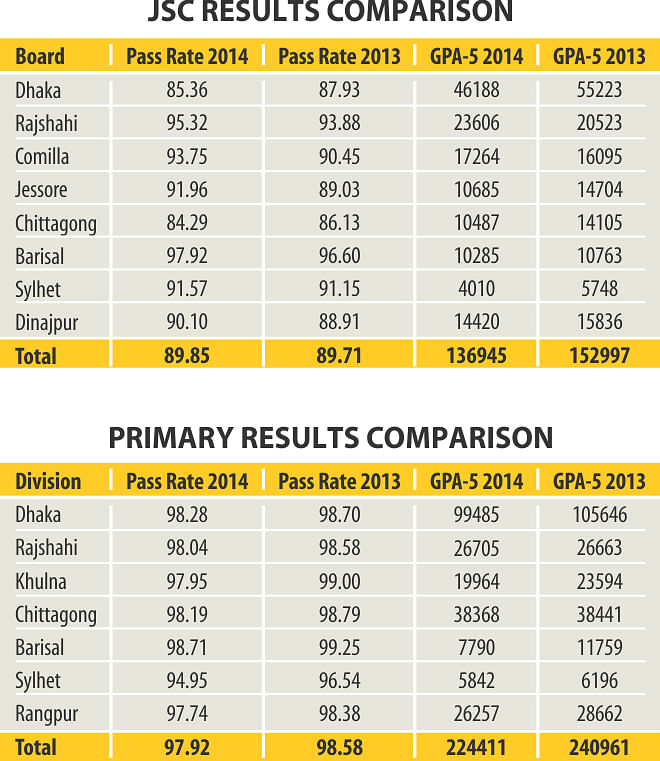Pass rate falls in primary exams

After a steady rise in the success rate since its introduction, this year's primary terminal examination results saw a drop in both the pass rate and the number of GPA-5 achievers.
The pass rate fell to 97.92 percent from last year's 98.58 percent while 2.24 lakh students secured the highest grade point average this year, down from 2.40 lakh last year, according to the results of the terminal exams tainted by question paper leaks.
Students of class-V had consistently been doing well in the exams since the introduction of the system in 2009 when the pass rate was 88.84 percent.
Officials, however, could not tell what caused the results to decline this year.
"It is a matter of research. We cannot tell the reasons now and it would not be proper to hold one particular thing responsible," said Primary and Mass Education Minister Mostafizur Rahman while announcing the results formally at a press conference at the Secretariat yesterday.
"We are yet to achieve the desired level of education in terms of standards and academic atmosphere. We have many flaws, yet we are moving forward.”
Teachers did not look after children's studies the way they should have and that may be one of the reasons behind the deterioration in the results, the minister added.
This year allegations had been raised of question paper leak of at least three subjects ahead of the exams. Parents from different areas had complained about leaks of sample questions through Facebook and other ways, saying that those questions matched the original ones.
The primary and mass education ministry, however, rejected the allegations and termed them as "rumour" and "baseless".
In his reply to a question, the minister yesterday said question papers would be set just a day before the exams from next year, sent to different zones through e-mails and then printed.
Mostafizur Rahman also said his ministry had already held two meetings in this regard.
This year's results, published simultaneously, show 12 lakh boys and 14.27 lakh girls passed the examinations in all six subjects, held between November 23 and November 30.
Students learnt about their results from their own institutions, online and through mobile phone SMS service soon after the press conference.
The results also showed a fall in other indicators. The number of failed pupils rose to 55 thousands from 35 thousands and the number of schools with the cent percent pass rate came down to 72,057 from 73,600. No student from 134 schools passed this year whereas the number of such institution was 46 last year.
Girls are slightly ahead of boys in terms of success rate, which are 97.97 and 97.88.
They also outshone boys in achieving the highest score with some 1.20 lakh girls and 1.03 lakh boys securing GPA-5.
Ministry officials say that though there is a slight fall in the overall results, students have done well in English and mathematics.
This year, 98.89 percent of the examinees passed in English while the pass rate in mathematics is 98.21 percent.
Monipur High School in the capital occupied for the fourth time the top position among 20 best schools across the country. National Ideal School and Milestone Preparatory KG School remained in the second and third positions for the last two years.
Like the previous year, Barisal has been ranked first among seven divisions, with 98.71 percent success rate. Sylhet is at the bottom of the list with 94.95 percent pass rate.
A total of 3,563 children with special needs took the exams and over 95 percent of them succeeded.
URBAN SCHOOLS FARED BETTER
Like previous years, the same renowned schools in the urban areas, especially in Dhaka, came up on the chart of the best schools.
Seventeen of the top 20 schools -- in terms of the number of registered students, GPA-5 holders and pass rate -- are from Dhaka city. The three others are from Chittagong, Comilla and Khulna.
Urban students do better because they have more access to private tuition and go through extensive classroom activities, teachers say.
A huge number of rural schools lack infrastructure and efficient and trained teachers, which is why their students do not do well in the terminal exams, said the head teacher of a school in Dhaka.
Besides, guardians in the urban areas are more conscious and spend more on their children's education.
STATE-RUN SCHOOLS LAG BEHIND
Schools affiliated with Primary Training Institute saw more than 99.84 percent of their students pass the exams this year while the success rate of government primary schools that have adequate infrastructure and other facilities is 98.30 percent.
Asked why the government schools are lagging behind, the minister said the authorities would look into the matter.
Sources, however, said the government did not have a proper mechanism to monitor the state-run schools. Besides the schools have teachers' crisis contributing to their poor performance.

 For all latest news, follow The Daily Star's Google News channel.
For all latest news, follow The Daily Star's Google News channel. 



Comments